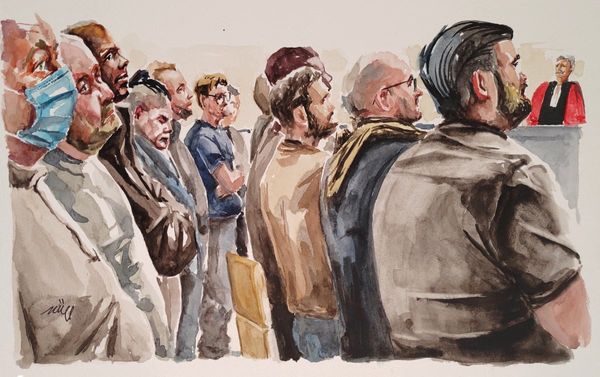The House overwhelmingly passed a Democratic resolution on Thursday evening to condemn antisemitism, Islamophobia and other expressions of bigotry after the freshman congresswoman Ilhan Omar again sparked controversy with comments implying supporters of Israel displayed dual loyalty.
The 407-23 vote caps a tumultuous week for Democratic leadership as they tried to contain the fallout over Omar’s latest provocative comments, while advancing sweeping election and ethics reform legislation that was a centerpiece of their campaign during the midterm elections last November.
All Democrats, including Omar, voted for the resolution while 23 Republicans opposed the measure, including the GOP conference chair Liz Cheney and several members of the arch-conservative House Freedom Caucus. The Iowa congressman Steve King, a Republican who was was stripped of his committee assignments after he questioned why white supremacy had become an offensive term, voted present.
The seven-page resolution states that “whether from the political right, center, or left, bigotry, discrimination, oppression, racism, and imputations of dual loyalty threaten American democracy and have no place in American political discourse”.
It cites the neo-Nazi march in Charlottesville, Virginia, the mass shooting of African American churchgoers in Charleston, South Carolina, the massacre of Jewish members at a synagogue in Pittsburgh, and attacks on mosques.
Though the document does not name Omar, it was drafted by the Democratic congressmen Jamie Raskin of Maryland, who is Jewish and a member of the Congressional Progressive Caucus, and Cedric Richmond, a member of leadership and a previous chair of the Congressional Black Caucus, in response to her comments.
“It’s not about her,” the House speaker, Nancy Pelosi, told reporters on Thursday. “It’s about these forms of hatred.” She added that she did not believe Omar had understood the “weight of her words”.
Omar, who in January became one of the first Muslim women to serve in Congress, said Israel’s supporters push lawmakers to pledge “allegiance to a foreign country”, a remark that was viewed by lawmakers of both parties as playing into the antisemitic trope of “dual loyalty” – a myth that Jewish people are more loyal to Israel than their country of residence.
How to respond to the comments became a source of internal tension. Some in the party believed the resolution should condemn antisemitism, while others argued that it has unfairly singled out Omar and should be broadened to include anti-Muslim bias.
She said the controversy afforded Democrats the opportunity to unequivocally denounce bigotry, attempting to draw a distinction with the US president.
“The president may think there are good people on both sides,” Pelosi said referring to Trump’s comments after Charlottesville. “We don’t share that view.”
The controversy exposed a rift within the Democratic caucus that cracked along generational, ideological religious and racial lines. Republicans for their part have largely enjoyed the show, interjecting only to fan the flames.
Congressman Lee Zeldin, a New York Republican who is Jewish and voted against the resolution, asked why Omar hadn’t apologized for her comments this time.
“I don’t believe she is naive. I believe she knows exactly what she’s doing,” he said, adding that criticism of a foreign government is every America’s constitutional right but “it is not an American value to be hurling anti-semitic rhetoric”.
Some Jewish lawmakers said they were disappointed in the resolution’s broad scope .
“We are having this debate because of the language one of our colleagues, language that suggests that Jews like me who serve in the United States in Congress and whose father earned a purple heart fighting the Nazis in the Battle of the Bulge, that we are not loyal Americans,” congressman Ted Deutch, a Florida Democrat who is Jewish, said Thursday in an impassioned speech on the House floor.
“Why are we unable to singularly condemn anti-semitism? Why can’t we call antisemitism and show that we’ve learned the lessons of history.”
Omar, who came to the US as a refugee from Somalia and is the first woman to wear a hijab in the chamber, has been vocal about the racially and religiously motivated attacks that she’s endured, including accusations that she is “un-American”. A sign posted in the West Virginia capitol last week displayed a photo of Omar below a photograph of New York’s World Trade Center burning after the al-Qaida terrorist attacks of September 11.
The Minnesota congresswoman is part of a cohort of young progressive lawmakers who are openly critical of the Israeli government. But critics argue that her remarks amount to a disturbing pattern of antisemitism. She apologized for a 2012 tweet in which she said Israel had “hypnotized” America, then again for suggesting that members of Congress support Israel because they are paid to do so after an unflinching rebuke by her party’s leadership.
But this time, her comments sharply divided Democrats. Some lawmakers argued that Omar was being unfairly targeted – and believe the issue is being inflamed by conservatives eager to drive a political wedge in the caucus. The presidential candidates Bernie Sanders and Kamala Harris defended her.
“What I fear is going on in the House now is an effort to target congresswoman Omar as a way of stifling that debate,” said Sanders, who is Jewish. “That’s wrong.”
Harris said Democrats must “speak out against hate” but added that there is a “critical difference between criticism of policy or political leaders, and antisemitism”.







